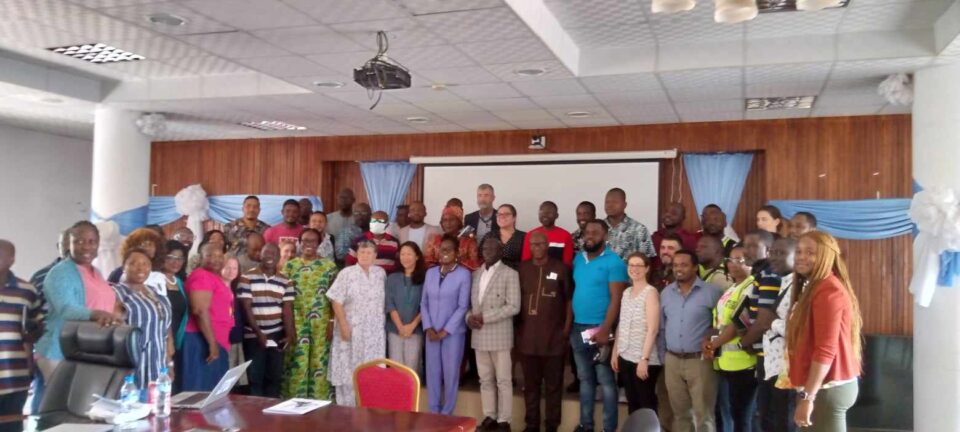WHO Describes The Result As “Impressive”
PHOTO: Liberian health officials, WHO and other partners pose for pic during the launch of the report
By Alfred Kollie, alfredkolliejr92@gmail.com
The Ministry of Health through its Malaria Control Program has launched the 2022 Liberia Malaria Indicators Survey report, which highlights some progress in the fight against malaria in the country.
The 2022 Malaria Indicators Survey provides population-based estimates on malaria indicators including malaria prevention, case management, and prevalence of malaria and anemia inform strategic planning and program evaluation.
Speaking at the launch of the report over the weekend in Monrovia’s Congo Town suburb, World Health Organization Resident Representative to Liberia Dr. Peter Clement said the report is impressive, especially for Liberia’s health sector.
‘’We are not only celebrating the results, but also we celebrate the taping of this disease that has over the years, killed millions of people, especially women and children. It reversed productivity and development and broke the hearts of many people,” said the WHO Representative.
In the last decades, malaria was rampant, killing more than a million people each year, mostly children in sub-Saharan Africa’’ he said.
According to Dr. Clement, in Liberia, “climate change emerges as a major driver affecting malaria transmission and overall burden.”
The previous presenter showed all those people working inside the water and the water levels increasing weights throughout the year to reduce malaria incidence and mortality rates by 75% in 2025 and 90% in 20-30, in line with the SDG targets, the WHO Representative explained.
“But as you all know, unfortunately, the world is off track with the 55% gap for 2025 targets and accurately 53% in terms of reducing mortality. Notwithstanding, these figures will not fool us.
Some progress has been noted in malaria prevention,’’ Dr. Clement observed.
He said the impressive results or report presented is a testimony that malaria cannot enslave forever that he was pleased to note the reduction in annual malaria parasitic rate, the reduction in deaths and the prevalence of malaria in children, as well as the use of ITN, especially by pregnant women, and uptake of intermittent prophylaxis.
“I congratulate the government of Liberia and the people for really sowing an exit door to malaria. While these results are encouraging, more work is urgently needed to get malaria to the archives of Public health or archives of history and end it as a public health problem in line with the Sustainable Development Goals targets for the reduction of malaria incidence states that scale up delivered of comprehensive interventions bring results.’’
All the efforts that were made from Nets to diagnostics and the treatment are very important indeed. You can agree with me that malaria is being taken by but by no means should be get. We should defeat it.
We know what to do. We know how to do it, and we know what greatest efforts are needed by all of us sitting around the table’’ the World Health Organization Resident Representative said.
In remarks, Health Minister Dr. Wilhelmina Jallah thanked the Malaria control department for the report maintained that the report is important with lot of benefits for the ministry, partners and government.
“The first benefit is to improve understanding of malaria, including what we just heard, demographic group, geographic distribution, management, net usage slides, children and Malaria. The data is critical for targeting intervention and resource allocation,’’ the Health Minister observed.
Dr. Jallah also said, finding case can also inform policy maker and public health official to make evidence- based decision about malaria prevention and control and for example resource for malaria control distribution, whether or not they need more Nets, whether the Nets should be impregnated with something else or and whether or not we need indoor residual spray program.
According to her, the report has also shown the effectiveness of ongoing malaria prevention and control program and gives another baseline to monitor malaria control in the country.
’’But one of the other things that it gives us is how? Because we heard how much money have already been spent in trying to take care of the malaria situation in the country.
But now hopefully the new research resource mobilization will go through malaria elimination the next billions or $1,000,000 a year.
Let us come back to say like other countries that we have eliminated malaria here in Liberia’’ she observed.
The Liberian Health Minister observed that the report also has empowered and will serve also to empower the communities but want the s survey result out to each the communities.
Health Minister Jallah stated that the report can contribute to more effective malaria control and prevention effort ultimately leading to improving public health outcomes in normal Liberia thereby extending thanked to the US Government, the PMI, the USAID for their continuous contribution and support and excitement for improving malaria in Liberia.
“We want to say a big thank you and to all of you for coming this day to help us to all be happy. And we’re having just great achievement in malaria. And hopefully the next time we come back, we’ll be saying malaria has been eliminated from Liberia. Thank you,’’ she ended.

